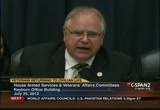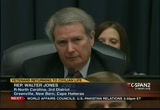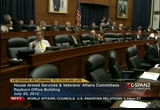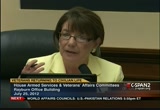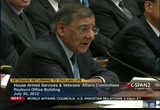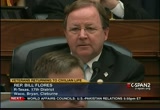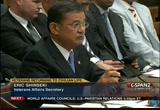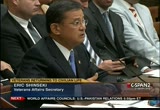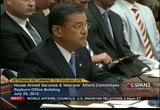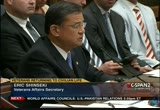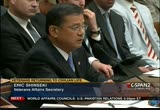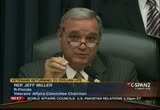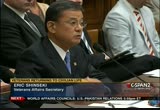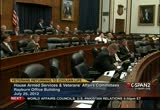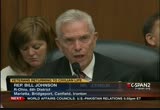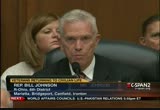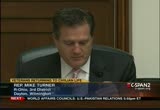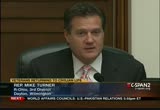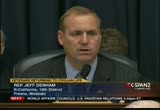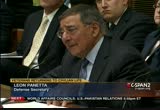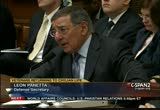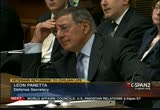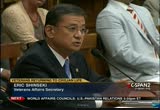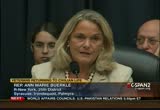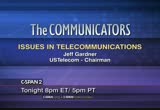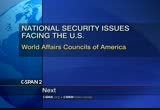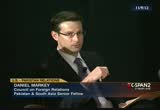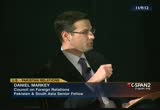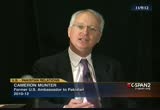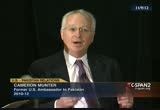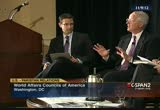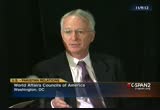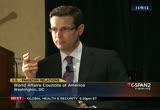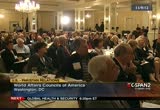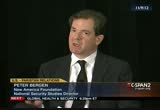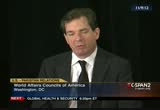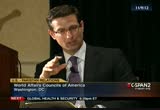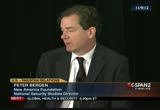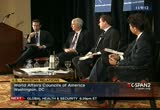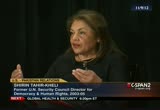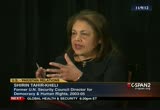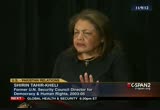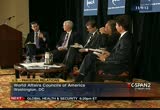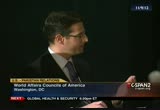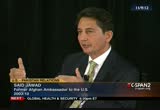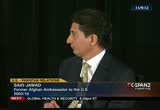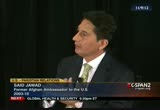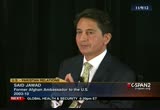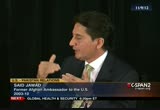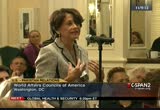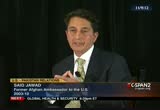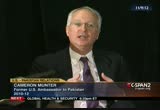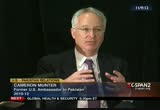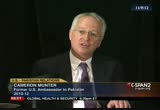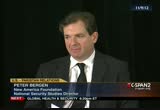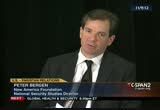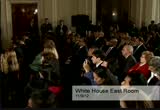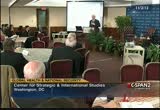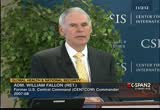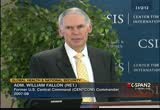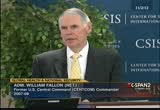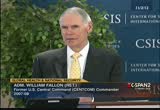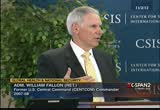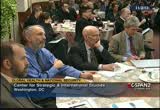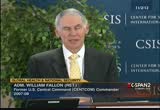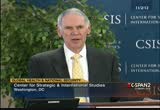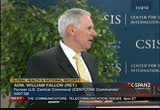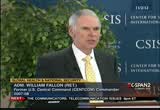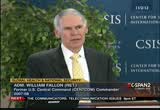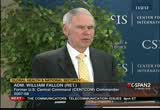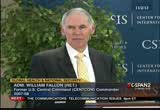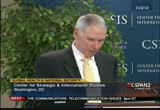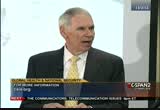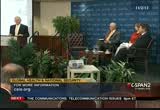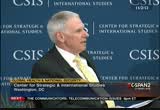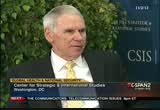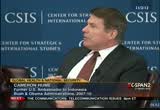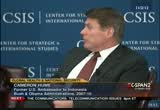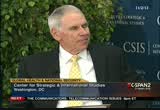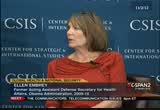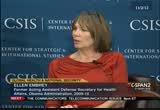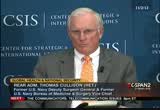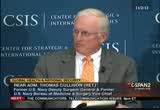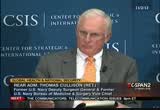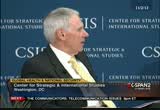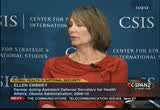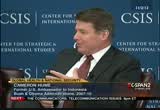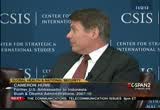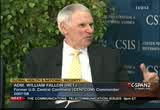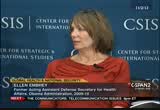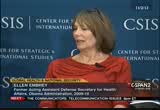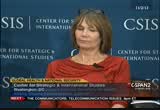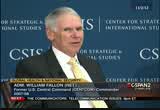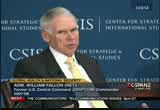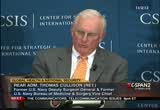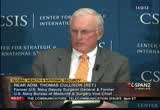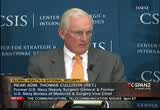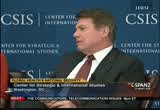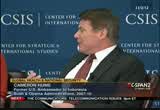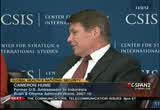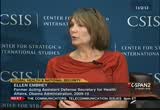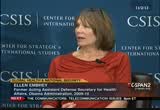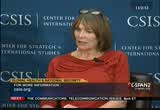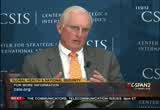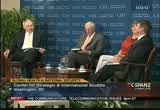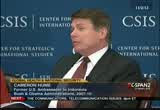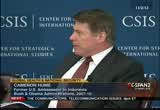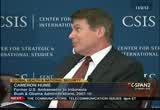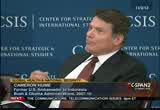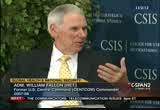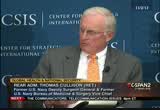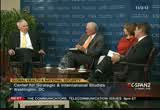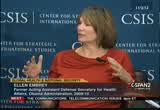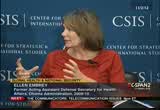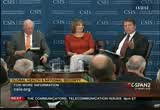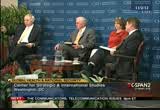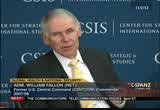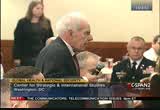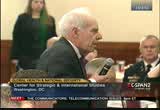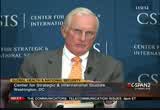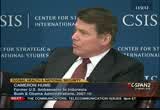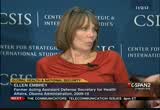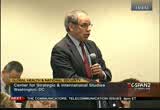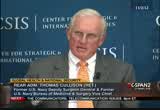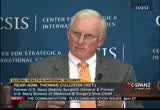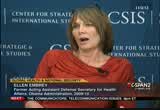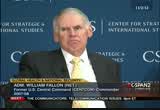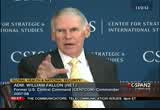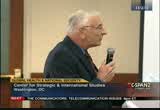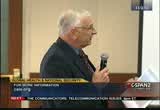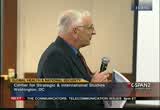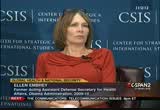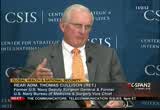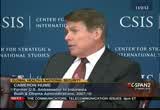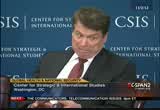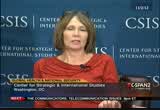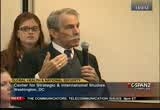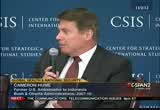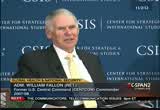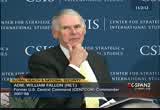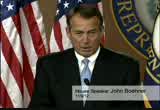tv U.S. Senate CSPAN November 12, 2012 5:00pm-8:00pm EST
5:00 pm
existing and could have been whether it was existing or exacerbated by their combat experience, their time in the military, they're not getting that care through our wonderful folks at the va and how do we fix that. as these have decreased, adjustment disorder have increased. so i thank you both for paying close attention to this. i yield back. ..
5:01 pm
the house position basically said to that individual if you have given less than honorable discharge, and you could go back to the department of defense and asked the department of defense to review of your medical records and maybe change your discharge. and i would like to note how you all are handling this issue and how you have contacted those that were me be given less than honorable discharge. >> congressman, let me respond to you directly in the department because the first time i am familiar with the issues you just presented and i want to give you an accurate answer. and let me give you that answer to the department. >> thank you mr. secretary that would be satisfactory and thank you very much. i yield back. >> ms. davis. >> thank you, mr. chairman and both of you for your leadership
5:02 pm
and trying to work and coordinate these programs. i wanted to ask you about coordination and about resolving this this alignment between the two coordination programs between the do and the va. you talked about traps and trying to get over that. what is it is causing these problems? i know one of my colleagues mentioned earlier it seems to be creating more confusion than anything else. >> well, you know, the biggest problem here is these things have developed on separate tracks, and as a result, you know, you have to bureaucracy's the basically developed their own approach to dealing with these systems and they get familiar with them. that's what they use. they resist change and coordination. they resist trying to work together and that is the fundamental problem we have. >> we tried to switch off occasionally. i think one of the other issues i wanted to ask about was
5:03 pm
counseling because the coordination program as well as the transition gps program that the president has proposed and we are moving forward on call for the counselors and we know the problems and mental health, but how are we planning for the kind of counselors agree to be needed for this? because clearly they have to be cross trained in many ways understanding both systems as well as small business, etc.. how are we planning for the emerging of these kind of folks that are going to be critical to this but we don't have them in any great number. >> that, i think is the key to making this transition work is to have the counselors that are familiar both with veterans and the defense areas. what are the benefits, what are the opportunities that are available and be able to present that. so it is going to take some training of the people that are going to be part of this effort so that they provide good counseling to those that are involved. >> is there a cost factor involved that we need to
5:04 pm
address? >> there's quite be a cost factor involved, and we will have to -- >> me i just suggest there may be great models around the country weekly have one ncta go and if we can look at those models that would be helpful. >> mr. flores. >> thank you, mr. chairman and secretary panetta and secretary shinseki for being here and also psychiatry panetta for protecting the dollar for those that have earned it. my question is a little more theoretical, and what promise this is the claims processing time at the waco claims regional center in texas, which is the worst in the country when it comes to at adjudicating disability claims. what can we do if the ids doesn't work. what are you thinking in terms of a new paradigm to fix this issue and both of you can answer or either one of you, but it
5:05 pm
seems to me like we've got cultural issues that cannot be fixed by having new systems. so how do you make -- you are doing your best to get the systems right but what are we doing to fix the culture so that we do what we promised our military men and women and veteran's what we would do in terms of providing benefits for their service. it just seems to me like we spend all of our systems we are not spending the time of culture so can you help me with that? and let me interrupt before you answer. one other thing. you think about a pilot program so if ids doesn't work where is the clean sheet of paper? where is the white board that has the big ideas to fix this? >> congressman, look i just want to be sure i am answering the right question. waco claims would sound to me like disability claims that we normally handle. ies is a joint program that the dod end of the va said it is the
5:06 pm
question that you have here. we have piloted ies and started with 27 sites. these are the dod initiative with va and support with 139 sites now fully operational across the nation, and i think we both have put into place controls that will drive this to the target which is 295 days for processing. that sounds like a lot of time. on the one hand, when we did our systems independently come as a krin chollet, dod first and like 540 days. right now with an integrated disability evaluation system, that is down below 400 days, and we are targeted on 295. when we get to 295, which is going to be better, and it sounds like a long time, but
5:07 pm
involved in the two injured 95 days is care and surgical procedures that veterans that have been injured are still going through, and there's leave associated with that. when a surgery occurs in individual was provided x amount of days so to speak. all of that is factored into this to 95, so while it sounds large, it is a treatment and transition program and i think we have the right model year. what is incumbent on us is to get to the targets that we've described in the 295 piece of that is about 100 days. right now we are at 195 days and we have been as low as 103, and then we get the surge our friends in the dod and we adjust. but we know we can get to 100 days, and we are proceeding.
5:08 pm
>> secretary shinseki we know right now that they topped out at about 904,000 claims and you just mentioned there's about 65% of them over 125 days. 1.25 million projected for 2013. my question is can the current system handle the expected reductions and in the strength projected the president's budget and under sequestration and if you could give me a yes or no answer and then he elaborate in any way you want to to clarify. >> your number is a little higher than mine but i will let set them, it is a big number and nearly 900,000 by my count. let me explain why the inventory that's the total number of claims and processing and the backlog portion of that, 65% or
5:09 pm
so, 550,000 of those in the last three years the va has made significant decisions. we awarded agent orange service connection for vietnam veterans, three new diseases. we'll word of the gulf war illness, nine new diseases for the veterans that have been waiting in the case of the gulf war veterans, 20 years since the conclusion of that conflict for the vietnam veterans, 50 years. we also granted the third decision was the combat verifiable ptsd service connection for anyone who's served in combat and has been diagnosed with verifiable ptsd. >> my time is running out. how will sequestration and these reductions impact these claims going forward? >> well, i would say that in the
5:10 pm
case of the va, we have been informed that the va is exempt from sequestration and administrative costs. i don't have a definition of administrative costs right now. but i would say that i met secretary leon panetta and the reason you have the two of us here whatever impact him is going to have some affect even the life and exempted and it has my attention. >> mr. secretary, you said that possibly administrative costs would be affected by sequestration the president the other day said no better than issues would be touched by sequestration. can you explain to this committee because there are still some conflicting information out there from the
5:11 pm
acting omb director that i got back in june. how much is the va going to be affected by the sequestration? >> i will go back to what you received exempt from the sequestration. i don't have the letter in front of me did i think the administrative costs were listed in that. >> it's your understanding no benefit from sharing program account would be subject to only administrative costs? >> and again, if you would like to take it for the record -- >> this would be one that i would provide to you response for the record. >> mr. bordallo?
5:12 pm
>> thank you mr. chairman, secretary pena and secretary shinseki. secretary shinseki, we talked about suicide quite a bit but can you provide an update on your efforts to end of veterans homelessness? can you give an estimated number is it a serious and what programs do you have in place? >> congresswoman, i think may be familiar with the fact that we in the department of veterans affairs have established 2015 as a point in time where we intend to and veteran's homelessness, and when i say and veteran's homelessness there are two pieces. one is the rescue and that is getting everyone on the street off the street into housing and and to programs that give them treatment for substance abuse, training for employment and moving on with their lives.
5:13 pm
what won't end in 2015 is prevention. prevention will be ongoing. what do i mean by prevention? right now we have about 900,000 veterans and the g.i. bill programs, and that is colleges, universities, community colleges, technical trade schools any youngster that feels out of the program right now in this economy is at high risk of homelessness so our prevention effort here is to make sure youngsters get into school, stay in school and graduate and have an opportunity to go on and work. a housing mortgage program last year about 90,000 veteran mortgage owners who had defaulted on their home loans were able to defer roughly 75%
5:14 pm
of them to be effected from their homes and that is with the va financial counsel helping them get control of their finances and monthly payments, extending the payment period but the return to us is we are able to ensure stability and that we will deal with these veterans as homeless veterans otherwise, and the records indicate it's about three and a half times that for veterans that are not homeless, so there is an important aspect of this and why all i say that we were able to save 75% there's still 25% we did not save coming and we have got to just do better at it. >> thank you mr. secretary. >> mr. johnson? >> thank you, mr. chairman. and both of you, general
5:15 pm
shinseki and secretary panetta, i've come to respect greatly both of your commitments and your heart for our veterans. i will tell you though that i am not convinced that all the members of your organizations and departments share that commitment and will follow through with the commitments that you are making. i understand that you can't account for the last ten years, mr. secretary, and i am the stand that you have to bureaucracies that don't necessarily like to be told what to do and get along all the time, but i will submit to you that another five years is unacceptable. it's unacceptable to me this is not a matter of can do and should do. this is a matter of want to and
5:16 pm
will do. this is 2012, and one of the underlying issues, mr. secretary, quite honestly is the lack of an overall information technology architecture you and i have talked about this before, and it still doesn't exist today as far as i know. i've pointed that out and my committee has pointed that out and outside they've looked at the va's i.t. department and have pointed that out. i'm just not convinced that five years from now given that i don't know where you will be, but my fear is that we are going to be sitting here talking about the same issue again because we are not going about it with the discipline i come from an information technology career of over 30 years. i worked at u.s. special operations command as the director of the staff i know what it takes to get this stuff done, and five years, gentleman
5:17 pm
is totally unacceptable. and i don't really have a question for you. i just want you to fix this for crying out loud. >> can i respond? congressmen coming you and i but primarily roger baker and you have had this discussion. i work with you and we believe we have the good mark on architecture and i haven't satisfied you. we will come back and work on it again. >> mr. turner? >> thank you, mr. chairman. thank you for being here. i appreciate your leadership i want to particularly thank you for your work on sexual assault which and you were working on with the secretary of the va in your efforts to change the culture throughout the dod to prevent sexual assault and assist the victims.
5:18 pm
the members have been of service members and families transition and out of the military secretary panetta of the most important things transition with a family is obviously that raises the issue of custody and german miller and the committee chairman of the wilson center and i want to acknowledge the chairman, former chairman custody the house as you are aware has passed eight times the legislation that would protect the rights of service members, the committee twice past six times considering gates' endorsed the provisions the committee had passed and you had sent a letter suggesting a compromise the senator is right to be dropping in the senate and i just want to ask for your support from that and also tell you we are going to need your additional assistance. the uniform condition just brought out a draft uniform bill that would change the state law
5:19 pm
and actually reversing all the progress that we have made actually in favor of taking the members custody rights away. we hope to have your support for senator bozeman's legislation. secretary? >> i appreciate that. as i indicated to you in my letter, i support the efforts that you have made. you have provided tremendous leadership on this issue and i will do the same with regards to the amendments. >> thank you mr. chairman and both of your being here today. like others before me, congressman turner i want to thank you, secretary panetta. i appreciate very much your efforts you have made over the last several months to improve the treatment of survivors and secretary shinseki, i was so heartened to learn of your interest in the documentary film of the invisible war.
5:20 pm
as you said that would starve during the military service and in seven of va and that so painfully highlights the bureaucratic hurdles survivors of such assaults which are frequent across all the services must endure to prove they are physical or psychiatric symptoms with military trauma and shows that too often the victims are not successful in pursuing their claims for assistance. to address one aspect of the problem, the fiscal year 12 defense authorization act included language that required the secretary defense in consultation with the secretary of veterans affairs to develop a comprehensive policy for the department of defense on the retention of and access to evidence and records relating to sexual assault involving members of the armed services. this policy is to be in place by october 1st, 2012. can you both comment on the
5:21 pm
status of this policy? i would also welcome any further thoughts you may have on how the claims can be processed faster and more accurately. >> it's a very important issue for me and i am not going to wait for the legislation and try to put that policy in place because i think it ought to take place. so, in providing that kind of guidance and assistance to those that have been the victims of sexual assault so they get the kind of support the need in order to not only get the care they need but if they want to continue their career to get the support they need that would allow them to continue their career. and i think it is fair to say that secretary shinseki and i are going to work together on this issue to make sure we can deal with this on both sides not only the defense side of veterans site for those ultimately move in that direction. >> we look forward to seeing that policy in effect. >> thank you mr. turkoman mr. panetta, mr. shinseki, great
5:22 pm
to see a book and mr. panetta has been working on these issues for quite some time with you and the area in central california. by the way, thank you for support on the veterans skills jon that was assigned this week into the law a good bipartisan effort that we worked on. after our afghanistan try and another issue that came up during the same trip was working with our veterans that on the active duty with the general bostick afterwards he had said that this is the number one issue the evaluation process before they get discharged making sure not a day goes by that they are having to wait for disability or the issue of 20,000 non-deployable men and women that are disabled on active duty, so he said was the number-one issue dealing with the legislative issue that needs
5:23 pm
to be fixed back in 1940 and the question that i would have to you is what can we get done and what would be your recommendation and what is the legislative fix that you need us to pass the would help with this overall disability evaluation system? >> my view is that one of the most important things we can do is address the wounded warriors and the ability of those individuals if they want to stay in the service we have to do everything we can to help them stay in the service if they want to move on then it becomes something where we've got week and the v.a. have to work together to make sure that transition is as smooth as possible. we have a tremendous amount of focus on this and i guess probably the one key is again helping us in terms of funding to make sure that we have the funds necessary to complete these evaluations and give them the assistance they are going to
5:24 pm
need once they move on to read that is the area for me. >> outside of funding is there a legislative fix that you are looking for? >> at this point i have to tell you i think we have the pieces we need. we just have to be -- we have got large numbers we have to deal with the programs in place, the assistance is in place, we just have to make sure that we provide the resources necessary so that we can do what we have to do to help them that's the key. >> thank you. mr. wittman? >> thank you mr. chairman and secretary panetta. mr. shinseki, thank you for joining us. psychiatry panetta, i want to ask about how we can better align the military to civilian jobless in transition especially as it relates to the certifications. give you a great example. you take a highly trained combat medic that comes back home and wants to become an emergency
5:25 pm
medical technician. unfortunately, as you know, the certifications prevent him or her from doing that and has to go through lengthy schooling and take on lots of debt. many times they could probably be teaching the class. how can we better align the skills that are obtained in the military to parallel what they could be pursuing in jobs on the civilian side and that is one of the categories i know you are aware of and it's a matter of taking that job description and figure out how to be a line that or get some parallel with what you're doing in the military versus the outside. >> well, it is a great point and something that actually the first lady has dedicated a lot of time to. we have got to push the states to try to develop some common standards here with regards to the accreditation and these various jobs. these guys come out and the have great skills. the work in these areas. they have done -- the have done
5:26 pm
tremendous work in their particular skill. viewed to come out and then have to drag them through a whole process in order to be able to the skills and make them applicable, that is something there are a number of states that are willing to basically take these individuals and take the accreditation that we've provided and incorporate that at the state level. we've got to get all of the states to recognize that kind of credentializing. >> mr. secretary, is it something you within the duties of these individuals come out and they become a trained medical and they will also at the same time bigot the certification get something in the military to say by the way, now you have a credential that an emt within that particular state or they have some kind of way that there is an equivalency there because they are obtaining the same skills there as they would outside? >> that is a good point and one of the things they're looking at is can we develop some kind of a certification within the military that would then be transferable in terms of their getting a job.
5:27 pm
estimate it sounds like it would just a line of things that align that there could be some reciprocity. >> that's right to get a good point. >> thank you mr. chairman. >> mr. courtney. >> thank you mr. chairman and both witnesses for your attendance here today. secretary shinseki, wondering if you could talk for a minute about initiative that falls under today's hearing that is a very exciting example of the work the va has been doing with all i.t. that is a blue button program which again is something that you have surpassed in the private sector in terms of trying to get patients control over their medical situation as well as make a system in our health care delivery. i would say that is the one button that has received a lot of attention and there are civilian health care systems that are adopting the concept
5:28 pm
and that is whether the single stroke of a mouse on the internet you are able to access your data, personal data regarding health care, and you can download your records and take those records and use them as you would with your own private physician. it has tremendously grown in science and to the millions and we think that this is also helpful for the sector having that kind of concept capability. >> the nice thing about it is it gives the patient control in terms of being able to move from one provider to another, and again, just congratulations to you and your team for leading the way for the whole health care sector in terms of that initiative and i know the comments have come up and i am running out of time. the issue of regionalizing
5:29 pm
claims is emerging as an issue in connecticut as well and i look forward to working with your department to try to solve that problem. >> we will do that. >> thank you mr. chairman and both of you for being here and for your service to the nation. it's an honor to have you here. my question has to do it and you have heard some references to it, the commission and the fact that now five years later after the issued this urgent call to streamline to make sure that we have a single point of reference for the care and the services and the benefits of the military we have two very distinct entities. we've had multiple hearings trying to get assurance from the dod and the va as to how you are going to get this together so we can make sure that our veterans get the services without being overwhelmed by an extremely complex system. so i would ask both of you today please, what specifically are the goals and what is the plan to get these entities under one
5:30 pm
roof so that we are complying with the commission and the recommendations for the veterans. thank you. >> the federal program in existence in 2007, and i guess the secretary panetta indicated earlier to get the departments launched and essentially developed the good programs that don't quite harmonize. we have a task force with the specific direction to study and bring harmony to these programs. where we are duplicating one another, where are we not doing things we should be doing? so it is going to get a good look here and i've seen the next couple of months i would be happy, and i think the secretary would be as well to make our people available to provide the results of that. >> the psychiatry and i share
5:31 pm
the same frustration. we have been working on this and frankly we have been pushing to try to say why can't we get faster results? why can't we get this done on a faster track? and you know, bottom line is frankly we have just got to kick and try to make sure it happens to this but i would suggest in your opening statement you mentioned commitment and that we look to our military as an example their commitment to our country and we should be that committed to them to make sure we get this job done by thank you very much. >> in just under 30 minutes from now
5:32 pm
i enjoy watching booktv and of various programs. c-span2 be to seize them provides coverage without all the sound bites and the kind of editing that you see in the programs and i think that there's a good opportunity to consume the misinformation and make up my mind about what is going on. c-span is a great way to get kind of a unfiltered view of the event. as the u.s. winds down its involvement in afghanistan come here is a conversation about american relations with pakistan. it's with of the u.s. ambassador to pakistan and the afghan
5:33 pm
ambassador to the u.s.. also a former adviser to secretary of state clinton. this was part of the national security conference hosted by the world affairs council of america. it's 45 minutes. [applause] it's a great pleasure to be here with such a great panel. 3g ambassadors and one globally renowned journalist and scholars. so, i've been told that there have been a lot of questions about pakistan and afghanistan so far in your proceedings, and i think we have a first-rate panel to start dealing with them. what i'm going to do in terms of focusing that discussion is i am going to tee off with questions to each of the panelists. one to each and then i will allow for a little bit of fallout and then i will open the floor to you so you have a little more time to engage with them. but the end debate could begin with the ambassador munter her
5:34 pm
you already got his biography that is i think in some ways almost uniquely positioned to provide us a very recent perspective on what pakistan looks like to the united states to the official american advisers and diplomats and also has lifted the u.s. pakistan relationship during what was an exceedingly difficult and trying time which is no reflection on him but a reflection on something much broader than that. so the question that i have for you, ambassador munter, is how americans understand pakistan? so often pakistan is at the top of the list of failing states, nearly field states, it is a country where we have a litany of problems, internal dynamics often look very troubling certainly from the outside.
5:35 pm
what direction as pakistan moving from your observation is it in fact failing or failed and how worried should we be about that as you look at it from your perspective having spent some time on the ground. >> thanks for the opportunity to speak about this and i will try to be brief with just a couple of points. one of the problems isn't just the of objective reality but the problem is what are the faults in the pakistani democracy which is a democracy even if it is distorted and what are the problems with its leaders? the main problem that i see in the bilateral relationship is that we have a rather pernicious stereotype about one another, the two - scum and american - and pakistan eight - i get info page. these are a bunch of thieves and double crossers that take on money and don't do what we want them to do. this is a widespread prejudice and there's enough truth to it in the sense that you can always find evidence of this that it
5:36 pm
guides a kind of - downward spiral and makes it very hard to develop trust. the pakistanis also have an narrative which is the americans' use us and discard us against the russians in the 1980's and toss us out ostensibly because of the nuclear proliferation in 1990. they use us in the war after 9/11, but after 2014 they are going to go away you can count on it that is the think americans are hard wired to desert them. this set of stereotypes is lazy and a very pernicious. one way to get out of this is to say hussain haqqani, my counterpart that suggested time for a divorce or someone who shall remain nameless that said it's time for containment to push this away. those two ridings are not reasonable alternatives that steve has said remaining engaged with pakistan there is an
5:37 pm
alternative to it. but i would argue that having a focus simply on the bilateral relationship is something that has been a problem for us and what we need to do is break out of this if you will the sterile debate and look at the issues that are crosscutting with pakistan's relationship to india and that have to do with a sequence of events that will take place after 2014 when the american focus once again as steve mentioned when the american focus becomes somewhat less the relationship through the counterterrorism and opens the door for the more creative ways of business, academic, a media that have really suffered in the last ten years. so i guess i come out to your question answering that i'm cautiously optimistic if we can keep things on the rail which you know what will happen over the last ten years isn't an easy thing and it's like rolling down the side do would be and you don't know how for the region
5:38 pm
goes so keeping things on track it isn't easy to keep things on track in pakistan because of the way that it's mismanaged and because of the difficulties in the relationship, but if we are able to do so i think after 2014, there will be a prospect that we could open up to new kinds of cooperation if we are not slaves to a bilateral mission that is based on this trust but if we focus on the multilateral and the regional issues that will ultimately lead to economic growth and relations with india and afghanistan. >> you've given an important addition to the bilateral relationship in the u.s. pakistan relationship and the need to continue to remain engaged. but i want to pull you back so that we have a chance to the specific issue of where pakistan itself is heading. there is a question of the bilateral, but how ways -- what was your sense of this country what is the direction that it is headed. >> i'm a refugee for academics those who can't teach become
5:39 pm
diplomats. but i will give you an assignment which is the british academic critical pakistan and the country that cannot in 2010i believe in which he describes a society that is stable but it's not very capable in the reform. in answer to your question pakistan has an enormous difficulty trying to make the progress of reforms that the friends of pakistan would like to see partly because of the tribal, ethnic, historical reasons. it's very difficult for the change to be effective. you have the player that wants to change things and you have the parties in the country which are the traditional power brokers. the system is very stable, but very difficult to move. i would argue that it is in trouble economically, it is in trouble socially. there are a lot of indicators that are negative and i will not take the time to enumerate them. if we are going to address those
5:40 pm
issues they have to do it across borders. that is if there was went to be a change in the economy it is clear to be because of a healthy relationship with india pity if they are going to deal with a society that is very fractured along religious lines and ethnic lines it is going to be because the groups in the civil society, ethnic groups, businesses and other people reach out of sight of pakistan's borders, so the short answer is i think that they are stock and the way to unstick them everyone realizes is not going to be -- it isn't reasonable to expect the current political structure has the vision to perform. >> we will go through some questions here shifting gears a little bit. i would like to bring us back to something that the embassador munter was saying about the center of the of the past couple of years of counterterrorism in the u.s. strategy, and we are
5:41 pm
all familiar with some of the much-heralded achievements the united states has made on the counterterrorism front. i would be curious to get to questions to you and one would be have we accomplished as much in counterterrorism in particular in pakistan and afghanistan as it appears as is widely be ported and claimed by the obama administration, and second getting into the more specific question of the drones because this has been the controversy will pull that has in many ways got us where we are and you've written extensively about it how would you say that we stand on the front in pakistan? >> thank you for those questions and for the opportunity. but have we accomplished? what we have accomplished is osama bin laden himself and if you look at the documents that
5:42 pm
were released, bin laden had an emphasis that i think it pretty well with any expert analysis of al qaeda which was the heavy deep, deep set of problems. the al qaeda brand is deeply damaged and he was telling others what to use and was bad for fund raising. it would attract a lot of negative attention. he was keenly aware of the program in the organization and he was advocating that al qaeda moved to eastern afghanistan which is one of the most heavily forested mountainous areas very difficult for the american surveillance to kind of see what is going on. he was of the advocating one of the richest and peaceful countries in the world away from the trial regions of pakistan. so he was aware they were running out of money and he was sort of dealing with ideas of
5:43 pm
attacking president obama and general petraeus and they were in deep trouble, so i think what have we accomplished? the best witness for this case we have accomplished a great deal. the drones have been part of that and the ambassador munter is very familiar with the debate that went on between the department and the cia. if you look at the strikes over the past four years in 2010 we had 123 strikes. the numbers have been dropping fairly precipitously with the highest number of strikes we have engaged in a and anybody in this audience knows president obama six times more drone strikes in the first term than george will you bush and his two terms in office. now the numbers of the strikes are up 40% in 2011 they have about 25% in that point in 2012 and i think this is a very good
5:44 pm
thing. you know, mainly because we shouldn't employee at all the time. he had the most important army chief of staff general chianti and he said why have you done 300 strikes it doesn't add to the i think that is a good point and if you look at the vision of the strikes and the the date of how many were civilian we at the new foundation think that the civilian is now very low in the single digits but certainly there is a civilian casualty problem in pakistan that we enjoy the favorability rating down from about 20% and they are part of that story of the cost of the successful drone program is 180 million that's a pretty high cost so because of the work of the people like ambassador munter was then pushed back against the cia saying this could be more discriminatory not
5:45 pm
all are necessary but if we have the opportunity with a bunch of low-level people on the taliban does that release of our interest if the cost is alienating the pakistani population? said the tactic has its place and one final point is sometimes this is done in their interest and that is something that we need to communicate perhaps better. the leader of the pakistani taliban he has literally thousands of pakistanis on his hands and the fact useful this is one of the world's worst kept secrets and the fact that we've been kind of -- i'm glad the administration is having a public discussion about this because this is something that does operate sometimes in pakistan's interest even more than america. >> just a quick follow-up i would be remiss if all of the work that we have done in al qaeda the unique reporting with
5:46 pm
respect to bin laden what would you say to the question about what pakistan likely did or knew about bin laden during the years that he lived what do you make of that circumstance what should we draw from that? [inaudible] [laughter] it was basically from 1999 until he was founded in coastal town in was on the fbi's most wanted list and responsible for the murders in boston. there is no evidence to suggest that and it's hard to prove that we have the compound that has been translated if there was a smoking gun. if it was a smoking gun proving
5:47 pm
the relations are not so good that we wouldn't have pointed out. is it the difference it and the diplomats and journalists similar than they know. there is no evidence that i have seen that there was high level complicity or knowledge about him being. this led to the problem this was for the pakistani military and intelligence and a different question that we are talking about. there is to my knowledge no evidence that they do that he was there at that time. >> in 2003 on the two locations al qaeda was at war with the pakistani state and that pakistan the state has been quite helpful and the operational commander of 9/11. they are held on al qaeda when it comes to the taliban as a separate story.
5:48 pm
i won't let you off the hook. the new america foundation if you're interested in drones to keep track of the drone strikes in the database to make all publicly available on the website others are using it to compile impressive maps if your interest in this issue i would commend them to you. we've already touched briefly at least in tacking on the relationship and its neighborhood and india is almost always cited as a driver for much of what pakistan does and for what pakistan is it's gotten better. perhaps significantly better and i would be curious how you would read that relationship and as a temporary tactical shift or
5:49 pm
something more than not. >> it's great to be part of this panel and part of this group. >> i would like to make a couple of general comments. pakistan is important because of the size and the state and its location i'm not sure that i would agree with the ambassador munter as a sort of static period. it's going through a wrenching process and it's an important time to see which way the process moves. if on the one hand it is a country where i still believe a majority of the people want it
5:50 pm
is all of the country where people have opportunities the government is run transparently with some responsibility i also think there are pressures but what to put in a direction of extremism where they become the institution for all of those things just the development and it's actually a moment of great tension within pakistan or it is a moment that drags out and isn't going to be resolved tomorrow and it's in turmoil. given that there are some things in that picture that only the pakistanis can fix and we can talk about them and enumerated them. i would like to spend a minute talking about where the u.s. has a new term for the administration coming in what is it that we can do.
5:51 pm
and even that may be marginally important, but i think because we do spend resources and sleepless nights, not me anymore but others do, looking at this issue of what to do and that is something that needs to be sort of focused on and some of these have actually been for the last two years in the conversations bill would come out of the government to bring myself to come back to washington. as hadley said and many people will say, pakistan is in many ways more critical but pakistan is much more critical because the point in the that makes life more difficult and pakistan, so
5:52 pm
i think in some ways it wasn't a great india and pakistan india so far is off track in terms of these issues. i think it hasn't worked. it's more of a regional picture. it remains very critical and important in pakistan and afghanistan. there i think at this time the united states at least brokers a solution of a long festering issue that is the recognition of the international border between pakistan and afghanistan. it is very difficult to make the point when the u.s. withdraws that by declining they should
5:53 pm
say on this side of what? if they do not recognize the existing border as the international border which everybody else does, then it makes the case harder. nobody assumes that it's going to extend to the river just as nobody should assume that their brand of pakistan should extend into afghanistan so there is a defective that needs to delegitimize between 2014 or the conversation started it would be a very important thing. on the regional side, i think that india and pakistan have a productive relationship there are still a lot of people in pakistan and the quick thing i think there's the people to people awareness has gotten much better. my hope is having spent a lot of my life looking at the government to government and military to military that's sort
5:54 pm
of the lobar phase that the image of that changing not the most extremist of course, they will always retain that so they can go back into the change. but i think it is we to be harder for the politicians to make the case that people should go to war with india especially since most people realize it cannot be won. and people are getting a little fatigued with the military in pakistan in the resources. everybody knows they will not when the war. why do you need such a large military. i don't think the military wants it to become a burning issue. so something to keep the relationship improving and that is a very i think productive thing. finally, i think in terms of the regional picture, because
5:55 pm
obviously iran's issue, but i do think that it is important saudi arabia to sort of stop playing this game of looking the other way you need to develop the uneducated matters and so on and get them launched as a majority. to shift over to an era where it's never the nine months settled into pakistan but the mullahs and the mosques funded in the contributions often given by the members in the states
5:56 pm
sanctions proposed but it is tolerated and it is playing havoc in terms of the pakistani society to look at the history of islam and the continent. this and they have the title of people in the holy places doesn't give them an open-ended thing to mess with that has nothing to do with it. this makes no sense never mind a long term but even in the short term. and i do think this is a part of the u.s. conversation as well as the pakistan a conversation. so the u.s. needs to start holding saudi arabia to some measure of transparency because it is that sort of constant raising the ante that is going
5:57 pm
to appear no matter how much money we put into education and to what we've worked very hard on and others to. so i think -- i hope this will be a part of the service that the administration can put on because for the security, stability and the development somebody mentioned a final thing i would say is in terms of the long term return for the u.s. money there isn't going to be that much money i don't know how much it's placed but what is delivered is going to be significant. i would put it on the education. i think the return for the small amount is pretty far more than the 15 or the one aircraft carrier. [applause] >> thanks for addressing not only the internal issues but taking us on a good tour of the
5:58 pm
region which included india but also afghanistan, and that takes us to the ambassador the role of afghanistan has been spoken of in the historical context at great length. we now face is very interesting moment in terms of the lead up to 2014 u.s. plans for the military withdrawal and what appears at least from the outside to be fairly concerted effort to find some sort of a political means to somehow bring this war to if not a clean end at least a messy close by drawing back some of the insurgents into the dialogue. pakistan's role in that seems to be especially fraut and i would be curious what you think of that because you certainly see the overtures of the pakistani
5:59 pm
government in a wide range of afghans now which appear to be somewhat different from the past. and you've been intimately familiar with pakistan's behavior in the years that came before. what should we expect from the pakistanis with regards to afghanistan over the next year or 18 months? >> thanks for a much for including me in this panel and a number of friends i have visited when i served as ambassador. thank you. for the rule that pakistan plays in afghanistan or in the important traditions the first transition is the political transition and the role that pakistan could play in bringing certain elements in afghanistan, so i would talk about the
6:00 pm
6:01 pm
>> the most lethal part of the taliban, and the haqqanis are fighting, and haqqani is not accused, but probably claimed of attacking u.s. embassy, helicopters, many hotels in kabul and others. it was 23409 an -- it was not an easy in addition for us to say, yes, we'll do it. bring them to the table, talk to them, and then they ask us why don't you include the u.s.? that was the second phase, include them in the reconciliation process. there was pushback by the united states on that front, so, this e they played in the reconsolelation is not constructive or unified overall.
6:02 pm
the reason is -- actually, blame part of that that the afghans, united states, and pakistan are not on the same page what the consolation means. we have now drawn parameters of the reconsolation. every time that one of us will make some progress, it makes the other party nervous. the afghan government nervous, talk of opening an office in qatar because they thought they were left out. there has to be, before we go to the tablings, we have to be on the same side of our side, between us, pakistan, afghanistan, united states, three important parties on that. on the issue of the transition of conflict economy and dependency of aid in the economy, we have signed a number of the trade agreements with pakistan. none of them have been implemented, none of them. recently, they closed down those that cost additional expenses to
6:03 pm
u.s. military and contractors and afghan companies so where we need to transition, actually, to a private sector led economy, reintegrate ourselves with pentagon into central asia, we don't see much progress in this front, and on the issue of transition to the security responsibility to the afghans, really, to take speedometer of the fight up on themselves because there is no shortage of courage or skill in afghan. the afghan should be fighting the fight themselves. u.s. should get out of the combat role in afghanistan. that's good for afghanistan and the u.s., and also, it makes limited use presence in afghanistan sustainable if no u.s. soldier dying in afghanistan. therefore, in this front also, there's not many progress or cooperation by friends in pakistan. we very much would like, actually, the afghan people, particularly the government, see improvement on that. just to end on very short
6:04 pm
comments on what some of the distinguished panelists have mentioned, i totally expect that the issue of not having any evidence on bin laden be in islamabad. hard to imagine someone hiding in west point in the united states and in a businessman, friewntly speak the language, that compound was so suspicious, a small intelligence service in afghanistan, they suspected that one of the pakistan leaders may be living there. we all from kabul knew something unusual. just on a short comment on that, and, also, what the ambassador mentioned, the issue -- i was not in favor of the beginning, and i totally told ambassador holbrooke back then i'm fine renaming it as part of or
6:05 pm
whatever or even if it's -- >> [inaudible] >> or even like, fine with me. [laughter] i was fine with it completely. [laughter] >> very good. thank you. let me just say, you know, we could probably have the panel go on for another hour, raising each question with each of the panelists and get interesting and useful answers, but at the request of the sponsors, what i want to do is open it up to questions from the floor so that they can field your questions and comments, please. >> hi, maria, world affairs council of hampton roads, and i direct it at the ambassador at the invitation, i was privileged to lead a group of six world affairs council leaders in afghanistan in march meeting with president karzai and potential presidential candidates. my question is one of the issue brought up with us over and over among the different members of
6:06 pm
afghan society we met with is a fear and concern of what happens after president karzai, and whatever one thinks of him and flaws, whatever, he has managed to, you know, keep the country, you know, under control for the last eight years, and, you know, get some legitimacy by the ethnic groups. is there anyone that you can see that would have that same legitimacy, overall, the ethnic groups with potential successors? thank you. >> thank you very much. to republic, actually, the foremanner leaders, give them ashuns that there's no revenge, but at the same time, be mindful not to create a sense among our leaders being in afghanistan or
6:07 pm
particularly in other parts of the world to get the notion that they are the only party, the only one that has the best, and therefore, should be involved in structuring or generating what's coming up. it's a tough balancing agent, but as far as who was involved, we have a civil society in afghanistan emerging. we have a significant number of people, actually, might have too many people planning on running so it is important for all of us to keep in minute and put the pressure on to have a transparent and fair election in 2014 because it is very much key to the continuation of what's been accomplished. >> great.bo0 >> hi, i'm joyce davis, world councils of harrisburg, and i want to complement the ambassadors raising the
6:08 pm
importance of education of women and girls, but to take it even further, we recently had a speaker from afghanistan, i think you may know her, who says this whole concept needs to be expanded to include also young men who have not had the opportunity to be educated, especially because of all the wars in afghanistan so i'd like to really ask you, is the united states missing the big picture of the thing that will keep our troops out of afghanistan and deal better with pakistan is helping to improve the educational system in both countries? i'd like you to talk about that. are we doing enough, first of all, in afghanistan, to create that educational -- do we feel the united states gets this, that's the key to conquering extremism, not just with guns,
6:09 pm
but with books. >> the u.s. tried, and i think we agreed that being both in afghanistan and pakistan and, but,sn+)uáu know, it's a questin of resources. of course, the boys ought to be the bigger picture, but given that the resources are going to be limited, and it's not going to be the trillion of, you know, billion dollars every month or whatever the expense is. the people say, okay, the war switch is off. we're not going to put a billion a month in education. that's not going to happen. one of the great sort of supports in the country for ending the wars is let's do something here, not be sending resources. given the limited nature of the practical sort of amount of money available, my sense is that, yes, of course, to educate the boys is good because then they understand why it's important to educate the girls -- [laughter] the fact is if you educate a girl, and she goes through,
6:10 pm
she's tomorrow's mother who has other, you know, there's a statistic in a poll in south asia, india and pakistan, that if you educate a girl, a woman, it ends up that you've educated 19 people because of the family system and the way it works. you educate the man, you educate the man. i'm not saying the men should be uneducated yahoos, but the fact is they find the resources. for the u.s. component, i think there's something good to be seen about, you know, we stand with the issue. it's important to us, and put pressure on the local governments to then put money on the overall. you know, that's one way of by passing the mothering system which if it doesn't have a horrific extremist element build into it, it provides literacy for the boys. >> if i could add on that, fist of all, i wanted to address your point, i don't think we're as
6:11 pm
far apart as you said about the dinism in society. my chenet with dinism is the issue to address the problems, but there's ferment in afghanistan and pakistan, and it's the most exciting part of what's happening, and for you, reaching out to the counterparts, if you can in pakistan, is something that would be a wonderful contribution to the effort dealing with civil society, and some of the also not so pleasant elements of the way the society in pakistan works. in the element of education, it's very important. what we tried to do after 2008, with the kerry-berman legislation in pakistan was try to match the ongoing military commitment we had with civilian commitment for the reasons you said. the reasons you invest long term in the development of society means it's likely troops don't have to go back, going long term. we made the mistake of trying to be all things to all people. we overloaded an enormous amount
6:12 pm
of money, a billion dollars a year. we're not as focused as we should have been. what we learned is a conclusion that i think if you've been working, you could have saved us a lot of money, but we learned we needed key areas, among them, education that would be priorities. we are -- the full bright program in pakistan is the largest school program in the world, for example. we spend an enormous amount of money on primary education. now, so do the brits. largest by far assistance program in great britain is the elementary program they are doing in pakistan. there's an understanding this is the way to get to the future in pakistan. within pakistan, though, there's been a constitutional amendment which is deinvolved the responsibility for education below the -- below the college level to the provinces, and while that is seen as a means of getting government back in touch with people at a local level, some provinces are really bad at affecting this.
6:13 pm
they simply don't have the capacity. we engage to try to build capacity at the government level, and i'll be honest with you, with mixed results. right, push on education, but, b, it's difficult at the end of the day from people from the outside to do things when there's not a vision from the inside that you can follow, and i'm not trying to say, simply, we have to throw it back at the pakistanis, but until the institutions that i was talking about that are static come up with a vision, they spend a pitiful amount of money on schools, but until there's a vision, it's hard for the good will of the international donor community to help them. there is private help, a number of chapterble organizations, and our philanthropic sector may want to help in that way, get out of the government business, but you're on to one of the key elements of our a relationship
6:14 pm
post-2014 could transform itself if we focus on things like education. >> i think we have one more question in the back. >> yes, allen livingston, houston world affairs council. you mentioned terrorist groups operating within pakistan like operating within pakistan like thev is there any effort to reign in by the isi, groups like the lat, which were operating and had ties in india operating mainly outside of the pakistan? >> you want to take that? >> a general observation because of the negativity in pakistan. when, in 2002, they fixed the elections to basically disadvantage the parties, and mma, the aliensz of pro-taliban religious parties, allowing them to control two out of four pakistan's provinces. in 2008, it was a free and fair election in pakistan.
6:15 pm
they were annihilated at the poll, lost control of the two important provinces, and so that is, i think, an important point for us to keep in our minds when we kind of critique, rightly critique what the pakistanis have done in terms of supporting the groups. the group that attacked in mumbai in 2008 is officially banned, but they continue to practice and function under a different name. it's identified with kashmir, this is a mass movement. it's more like hezbollah than an al-qaeda group providing social welfare services, meetings where hundreds of thousands of people show up so i think as a practical matter, the pakistani government is not going to crack down on what the group is called because they changed their name a number of times because it's seen as a kashmir liberation group with a certain legitimacy
6:16 pm
in pakistan. the question is will pakistan do anything about the haqqani network, and hitherto, they have not done that much. that said, they launched a major military operation in 2009 that devastated the taliban there. they launched a major operation which devastated the taliban, and you are talking about a quite complex issue that is not really amenable to a one sentence sort of declarative answer. i think it would be in pakistan's interest. after all, who suffers the most is the pakistanis. they say 30,000 civilians died in the struggle, pakistani soldiers died fighting the taliban than nato and u.s. combined in afghanistan. that's why i'm making an observation about this. it's complicated. pakistan is a large country with very differing views about what to do, but i think the last point to make is that sort of the religious robin hood image
6:17 pm
the taliban had about five years ago has more or less e evaporatd in pakistan. the latest development is the 14-year-old child who was, you know, assassination attempt against her by the taliban so i think in the long term, the problems of the taliban is pretty poor. >> as i expected and hotched, the panel provided us with more than enough food for thought. this could go for a couple more hours, and there's important issues about nuclear weapons and so on that we didn't even have a chance to really glance over. [laughter] hopefully, some of the other discussions will get to these matters, and i want to hope you'll join me in thanking the panelists for some great conversation. [applause]
6:18 pm
[inaudible conversations] >> 2013 should be the year we begin to solve our debts in tax reform and entitlement reform. i propose we avert the fiscal cliff together in a manner that ensures that 2013 is finally the year that our government comes >> i'm open to compromise. i'm open to new ideas. i'm committed to solving our fiscal challenges, but i refuse to accept any approach that is not balanced.
6:19 pm
i am not going to ask students and seniors and middle class families to pay down the entire deficit while people, like me, making over $250,000 are not taxes. the newly elected congress starts work in january, but the current congress has work to do throughout the year in the lame duck session. work is expected on the fiscal cliff like the expiration of the bush era tax cuts, federal deficit, raising the debt ceiling, and by how much, and plan cuts to the military spending. follow all the floor debates tuesday at 2 p.m. eastern with live coverage on c-span, and the senate on c-span2.
6:20 pm
next, admiral william fallon and navy deputy general moderated a panel discussion on how global health needs to be part of a strategic planning in military operations decision making. panelists discuss experiences in administering health care and policy considerations in making health and security a center of u.s. foreign policy debate. this was hosted by the center for strategic and international studies. >> let me take a employment to welcome and introduce admiral fallon skipping the part how he walked across the tidal basin to
6:21 pm
get here today. he's a very, very dear friend. he's had senior commands. he was, of course, the head of the central command, was the head of the pacific command. he was instrumental in opening up our relations with china and establishing new relations with india. he is in every sense the, you know, the diplomat warrior, what we most admire in our unified combat and commanders. thank you, bill, to you, for doing this, and let's turn it over to you. >> thank you. [applause] thank you very much. [applause] first big step. thank you very much, and welcome, ladies and gentlemen. while we're getting settled here, i'll have our panelists come up and get settled into their chairs and order dessert, and those of you who missed the chow line, it may be too late.
6:22 pm
[laughter] then, again, i don't think too many in this room are starving, not the same can be said for others in the world. i wanted to begin with first, in case you missed the copies of this on the way in recommended to your readings and perusesal. thank you for inviting me to participate in this event, and i'll get into that in a minute why i think it's really important. i'd also like to add my voice to the memory of tripp who contributed as he did to so many things in life to this effort, just before he passed away, and quite a remarkable man as john indicated with an amazing list of accomplishments in a
6:23 pm
relatively short life. tripp, hopefully you're up there smiling on these efforts and somehow using your powers and spirits to motivate us to do more and to do it better. i'd like to say a few things about the effort. the idea to tap into some of our most experienced leaders in both the civilian, diplomatic, and military side, to get their views and their experiences before they tend to disappear into the recesses of their memory, so that we can collect a body of firsthand knowledge through the experience of many people who have done a lot of connecting the dots between security, something that i spent
6:24 pm
four decades plus involved with, and something that an aspect of this word "security" that i think is fundamental and very basic, and as i've mentioned to some of you who probably heard this in the past, but i'll say it again that during my career, my viewpoint has changed significantly in the understanding and definition of what security really is, and my current appreciation for it is that it's much more fundamental, much more personal, much more down at the individual human level than i thought it was back in earlier years when we tended, certainly in the days of the cold war where i grew up in service to the country where we looked at things as those guys and those gals and us. it was state actors, countries,
6:25 pm
borders, and that made us insecure, secure, or somewhere in between, but as i had a chance to work with people around the world, i realized that it's much more fundamental. it's closer to each of us. how we feel about ourselves every day in our outreach to others has a lot to do with how we feel and how comfortable and confident we feel about our fundmental surroundings, and health is pretty important, isn't it? if you don't enjoy good health, chronically suffering from challenges in the environment or from whatever source, you're going to be, in my experience, not paying a lot of attention to things that are very far away, but how do i"n exist, how do i deal with the problem, how do my children and my family deal with these issues, and as we are welt
6:26 pm
aware, there's a lot of problems in the world. the good news is there's been a tremendous amount of progress, scientific knowledge, and many in the room have been major contributors to that, and we've made great strides. it seems to me one of the things that ought to motivate us today is to figure out how to leverage advances in science and medicine to actually benefit every person in this world that has a need that can be satisfied, solved, resolved by the advancements, and that's a task that we have in front of us, and why i'm interested in being here, why we're participating in this, and there's still a lot of work to be done. now that you're allñi here, noby leaves the room without signing a pledge without donating your
6:27 pm
time, effort to the clause; right? you wouldn't be here otherwise. let's talk a little bit or think a little if i can mote vat you to do that about the -- motivate you to do that about the business of our government and military capabilities and what they can do. as i mentioned, you saw a clip in the video. i believe the biggest thing and most powerful thingbipñ and fast thing brought to the table is disaster response. we have the capabilities to move quickly and do things to make a difference straight away. however, there are a lot of other things we can do and facilitate, and that's one of the thicks we're trying to get at in this series, why this was put together, why we wanted to pull people's minds, and what i expect happens here with the good folks at csis, steve,
6:28 pm
taking notes, they are going to call through this wisdom or what passes for wisdom from some of us, and pick out the things that ought to be worked todd next stage and be able it to do things to get it done, but back to fundamentals. the military is the strong right arm of the nation's defense, but in daily activities we must conduct, we do a lot of things that are important not only to the members of the military, but to the members of the country, but that have a significant effort in advancing the well-being of others in the world so we tend to think of the obvious things. we stand for freedom of choice. we stand for people able to go
6:29 pm
about their lives free from oppression and the things we know a lot about. in the process of doing that, we have a large group of people in the department of defense. they need medical care, and because many are working at a very high operational tempo, under stress, we want them to be in the absolute highest level of health that we can possibly provide, and so we have a very, very healthy group of folks, and we work overtime to make sure they stay healthy. in the process of doing that, we learned about people, about diseases, a loot about physiology and on and on and on, and one of the things we have to offer, we, in this case, the department of defense, is sharing that knowledge with others and figuring out ways in
6:30 pm
which we can actually export the body of knowledge and practice in other areas. another part of the department of defense that's particularly helpful in this regard is the research and development that goes on, and it's unique, best to my knowledge, it's not done anywhere else. it's certainly not done to the degree that it is that we have hundreds of people dedicated in different places around the world looking at specific problem areas, both in climate and in environment to better understand the problems, the diseases, the pathology that's involved, and i'm on thin ice as a non-method call -- non-medical type here, so i'll limit my divergence into the matters, but the center we have that i'm familiar with in indonesia, egypt, and other places do research that is not
6:31 pm
done in other places. it was certainly self-motivated in the early days to ensure we had service personnel in the best possible shape, in the tropical environment that we understand what went on in these places, and we're better prepared for it, but that body of knowledge grows, and i would hope that we can continue to nurture it so that we take the lessons from these efforts and move them out into the greater world so to try to pull this together, you have a), u.s. government military capability that has global reach, very, very rapid response, high volume, and the means to get into and operate in areas that are prone to disasters, and as we have just seen in our own backyards, you don't have to go very far these days. nobody else
6:32 pm
extent that we can. we have very sharp people, well-educated, well-schooled, well-trained, particularly in the medical professions, to make a difference on scene, and we have this ongoing research and development as background to make us all better at doing these things. these are the basics, and one of the things we'd like to draw out today is, okay, what else is there that we should understand? what else can we do? how can we take thesec'ñ attribs and capabilities and maybe make them better? i don't want to moo notary monol the time here, but i want to throw my pet desire on the table, and that is it's been a great honor, and i have to admit an eye-opener at first to go around the world, to places that are certainly less privileged
6:33 pm
than we are, and so see dedicated efforts of so many people, not just from this country, but others, who are trying to make a difference in places that need help whether it's a medical area, whether it's in general health and welfare of people advancing their education, but in this venue, their fundamental security, personal security through better health, and i see this all over the world, and my big wish is that we can figure out ways to connect various levels of activity. those in remote villages in a distant place in the world laboring away to make things better for a couple hundred people, major, well-resourced
6:34 pm
donors, philanthropic organizations and individuals that have greater leverage financially and access to other resources also working a lot of these same problems, and then government, like ours, with capabilities like our military, very quick response, big difference over a short period of time. how do we pull these things together? how do we help ourselves to help others and really make this a better place? seems to me there's gaps between these things that we might want to think about, maybe talk about. i invite you to help me make my wish come true that these things were much more coheerpt, and we leverage everything to make a difference. i think that's probably enough do is introduce our distinguished panel. many are well-known to you, i'm sure, but starting with
6:35 pm
ambassador yuim, a distinguished diplomat who served the country ably around the world, and last three years in indonesia, a country of great importance to us politically, economically, security-wise, and a major play in health so, ambassador, thank you for joining us here. no stranger to people who have been around the department of defense. in fact, she's much older than she looked. [laughter] several decades in -- [laughter] in service across the river, bringing her knowledge and experience to bear to help in the policy world and to try to make the defense department better performing andh better operating in helping us
6:36 pm
and others in the process. ellen, thanks for coming here. the gentleman with my hair color that i like a lot, actually, he's very distinguished looking, much better than mine. that's all your own; right? just checking. tom cullesson, navy admiral, medical retired, and he was the deputy sg, surgeon general, back in the day 6789 -- day. he's also much younger than i, december -- despite the hair. assistance, a nice operation started by one of my predecessors, a really great idea, andçsw he contributed toe body of work that we hope to leverage into something that's more useful than in the sum of
6:37 pm
its individual parts. so i'll go take a seat and invite someone else to run off here a little bit. the rules are i will pose a couple questions to the panelists just to get you warm up. you can take notes and so forth, and we'll turn it up, get into the audience, see what's in your mind, and feel free to hopefully make a question rather than a policy statement, but at any rate, but ideas out there, and, again, the objective is to make this a better document, to understand it, and figure out how we can do more with it. thanks very much. [applause] >> well, i think we have, in this panel, an opportunity to benefit from not only the collective wisdom of the distinguishedded guests here, but the fact that they have
6:38 pm
served in many different comparts during their careers, and i would expect that they'll have some interesting and potentially different views, but that's okay. that's how we learn, and so if i could pose a general question, and i'll tip them off ahead of time, ambassador, if i could call on you first, but what i'd like you to share with folks is your sense of this nexus if you would, between health and security at large, and things that you, because most folks have not had the opportunity to read this yet, unless they are speed readers like john, and so if you could share with us your thoughts about what do you see here for a connection in these things, and what's -- what has struck you through your career as things that might illustrate
6:39 pm
the importance of this or not, if you think that's the case. >> thank you very much, admiral. i'd like to go back to the earlier question you asked. how do you bring all of this together? i think it's a human connective tissue, and how do you get the relationships so that the people in the philanthropic organizations or the research organizations and people who are deployed in the field are able to find a means of collaboration, and there are maybe two aspects to this. one is how do you help -- let's see, deal with the problem as i saw in south africa with aids and a government that did not want to treat people who had aids, how are you able to make the human connections so that overtime you both prepare the society for a change in policy, and in terms of capability, but at the same time, build some
6:40 pm
political pressure, potentiality to the change to be likely, and i think in that case, it was interesting we were able to build relationships between u.s. military, cdc, nih, and south africa military with an interest in treating its own people to begin a pilot program which was opposed to the debt of the minister of health who called me at #-bg in -- two o'clock in the morning to harangue me before she had her liver placed for alcoholism. in indonesia, it was different. there it was a question of dealing with the risks of theñhr flu, how do you build relationships so that a country, a society has the confidence in research capabilities and collaboration with others so that they feel that they will
6:41 pm
share early warning risks, share samples, so that research can be done on a global basis. how do you build personal relationships? i think if you just think for a minute the risks to u.s. citizens from influ endisa is huge. 40,000 people a year die in the united states. if we had a real pandemic, how many people would it be? thiss is security that leaks the borders, and our best attribute, i think, is making the personal connections so that we get collaboration. >> ellen, you've have 5 -- a chance to view this particularly from the advantage point of the nation's capitol here. what have you seen, and in the basic relationship here, health, security? >> i think that health has no
6:42 pm
boundary in terms of state or country. aver country's infrastructure to address basic human needs, water, nutrition, health varies by resources and i can't -- too many to name, but from a national security perspective, when the infrastructure's up able -- unavailable to provide health or protect the health of a population, it becomes unstable, and when the government or the people in charge are unable to address that, then you end up with a lot of factors that influence their ability to preserve the peace and to work well with others. from our perspective, especially for those countries that are not our allies, it, i think, this is where global health and the dod, military, and with the state department, partnering with these countries to help them
6:43 pm
address their infrastructure vulnerability in health care. at the very basic level, however, i think when we bring in high-tech stuff, it's difficult for them to adapt because there's other infrastructure problems like electricity and water and things like that so, for me, the nexus there is if you have an unstable government that's not able to provide this, then when the u.s. military and the state department collaborate together to help stabilize that, that's where i see the nexus. it helps us with information. it helps to create the abilityát are confronting them, and to bring in the right resources whether they are ngos or big medicines that could help or whatever. i think that's where i see the
6:44 pm
biggest push. >> thanks, ellen. >> you've been a practitioner on the point, different places in the world, and recently out in honolulu looking out into the asia pacific. what's your experience? what do you think about this topics? >> thank you, dd mirl. let me talk about how we got our gray hair. [laughter] the first time i visited vietnam was in 1972 as a navy line officer, and-obviously in different times back then. the next time i visited vietnam was in 2003 or 2004. at that point, we were really trying to find ways to have military-to-military contact with the vietnamese. at that point, we were trying to find out -- find ways to talk to the vietnamese military, and if you wanted a safe topic to talk
6:45 pm
about, one of those is health. every military in the world recruits young people. they get them to do dangerous things on the behalf of the cause they believe innings and they have to maintain health. talking about the health of a military is a topic we all have in common. we don't talk about how to use the military, but the techniques to keep the military health is a safe thing to talk about. we worked with the vietnamese surgeon general at the time to arrange a surgical project with the army in their hospital. a year after that, we went back and talked about hiv prevention in militaries as part of the defense hiv and aids prevention program, the military part of the program, and, again, we talked about how do you keep a military safe when you want them to do dangerous things on one hand, but you don't want them to risk their heflt? that involved, over time, to where we had two or three hospital visits to vietnam.
6:46 pm
our relationship with better with the country, and i was out there with steve morrisson two months ago reviewing the last hospital shift, and i could not, in my wildest dreams in 2004, particularly in 1972, imagine that four people could go to a town in a former north vietnam, and ask questions of the local population about how they practice medicine unencumbered, and to see that evolution over that time period is fabulous. that struck me as to the value of military-to-military health topics for discussion. now, there's topics we can discuss on many, many levels, and one of the benefits in the u.s. military is capabilities from very basic primary care to the most sophisticated surgery in the world so whether we're talking to a nation in the developing world where they may have a surgical capability to increase or a country that's just getting started and has major problems about how to
6:47 pm
start any kind of a health system, we have the capability ies to discuss that with them with u.s. military physicians, but to the point ambassador hume brought up in the video, why should it only be military-medical personnel? one of the values of the hospital shift missions is it's not all military. it's military, it's ngo, partner nations all working together on a common theme which is health care. it sends a couple very strong messages. one, it's about the patient, not who is delivering the care. number two, if we have a common goal to work towards, people from different backgrounds work together. >> great. if i could go back to ellen, in the policy world, what's the -- how difficult or not is it to utilize the capabilities of our people within the department of
6:48 pm
defense? what issues do you see through your experience being raised here and is there anything we need to do about it or is it working to solve itself? >> from a policy issue, on the health side, we train our physicians to care for and create the ben jitteries eligible for care in the dod, and sometimes when we are engaged in care for others than those who are designated beneficiaries, the lawyers get a little sticky, and so it's -- the find line that we often walked was we needed training. we had relationships with countries, and we trained together to improve our ability to protect our forces in those countries, and at the same time, built a good will with the military and civilian members of the health infrastructure in those countries, and that's how we leveraged resources that were built for our own protection,
6:49 pm
but from a policy perspective, there was a directive that was published, i guess, in 2005, that said basically this is important to the combat operations as it is to our existence as a strategy. however, the resources did not follow that policy so i would say that, and those resources have declined, actually, in recent years, so i would say from a policy perspective, while we believe in this as the strategy, our investment in the strategy leaves a lot to be desired inside the department of defense for the health personnel >> and if we could extrapolate the situation from 2005 after the future, probably going to be continuing pressure op those resources; correct? >> yes. >> ambassador, could you give us
6:50 pm
a sense from your experience of how we are perceived in other countries, and the "we" here would be the health aspect of the military. do they -- do people recognize that there's a potentially unusually helpful part of this military presence that goes around the world or what's the ability to actually discern goodness from other general perceptions, some of which are not particularly helpful to us? >> i think it's uniformly deeply admired, but that doesn't always lead to a clear operational path. when i went out to i understand knee sha, one of the -- indonesia, one of the issues we had is they refused to allow our hospital shifts to visit, and this was correctly seen by people at paycom as what's this
6:51 pm
gratuitous insult? why can't we go there and do things that are just good for the people who are getting the treatment? indonesia, the character that they do, never explain why they do anything, and i came to feel that the best explanation was it was the opposite side of the deep admiration, but a feeling that people in the indonesia services built up, that the main consequence of this was our showing the i understand knee sha people that we would do good things for them that their own government failed to do, and 10 it was a -- and so it was a question of loss of face, and so, you know, those things can be fixed, and they are fixing it by the human relationships, and as you suggested, doing things together with our admiral, as
6:52 pm
you suggested, doing things together, bringing in civilian on the ships, closer cooperation with local services civilian or military, and it took two and a half years, but since then, there's good visits. i would say deep admiration. >> all right. ellen, how about this inherent conflict in the resource demand? what's your assessment of the efficiency, if you would, of our overall military capability? one of the chains that rattles around the building in the halls, down the street here, of course, is look at these individual services. they run their own empires, and dod allowed them to do this.
6:53 pm
having been on both sides, i'm with you. what do you see or think about this? an issue that or something that's really not important? >> well, i think it's -- well, i'm schizophrenic on the answer to that as a taxpayer of it, and a personnel of the health system and why it's organized the way it is. having confident capability to address the health needs of the force to maintain its ability to execute its mission anywhere that it serves needs a very strong, very capable medical forestructure. we have some added expenses to our mission deals with retirees, and family members which i think forces us to address a broader range of health issues than we would otherwise that's directly
6:54 pm
core related, mission related. i think that for a variety of reasons, political and otherwise, we owe the west we can offer to those who sacrificed so much for the country and their families and the retiree so part of me says we have to set up the structure to be able to doño' that, and te other part of me says, yes, but it's costly, and we could probably buy some of that capability for some of the force that we support. i think we are going toe find out -- going to find out how the unaddressed problem for the last 40 years is going to be addressed because resources are becoming so scarce right now. my sense is is that regardless of what happens, there needs to be a very strong focus to retain capability to address war fighter needs in whatever platform they operate on. they have to wear the uniform of the service they support op that
6:55 pm
platform. they can have a common practice, common infrastructure to share and information, but -- and that's where efficiencies can be occurred, but honestly, the most cost in the health care system is the sheer number of people and the infrastructure of the things like that. the only way to really reduce that is to reduce the infrastructure and the number people. the question is who do you reduce? that requires a very strong assessment of what is absolutely essential to support mission readiness and the force protection of the force, and continue to do the kinds of things that are important for our ability to perform our national security missions that include the research, the surveillance, the laboratories, the things we do that contribute to our ability to meet that nexus between global health and national security. >> that's great.
6:56 pm
you hying liked a couple things -- highlighted a couple things that i want everybody who is listening has an appreciation for that within the department of defense medical resources, there is not a carveout, if you would, where doctors and their supporting medical staff just deal with the people in active service. they are dealing with the entire family of active, retired, and spouses and children. we also don't have are reservoir of doctors and nurses and other medical people standing by for the an ex contingency in the world so when we have wars such as the last decade's endeavors in iraq and afghanistan, we don't just have a pool of folks that just come out of nowhere and deploy.
6:57 pm
these are people actively doing, inb. fact, serving in our hospitals, and, in fact, the hospital shifts mentioned. the manning of the vessels comes from other hospitals around the united states, people pulled off temporarily to man that, but it brings another point, and that is the complexity of all of this that we need a medical capability that deals with the day-to-day problems, challenges, of everyday living, people in the country, and others stationed around the world, but also those very, very special areas to deal with combat situations, the trama, and many things we've relearned or learned anew because of technology, good and otherwise, in this past decade, and so as a demand, it seems to me, for resources to get adequate
6:58 pm
training and to keep the readiness of the people up at the same time dealing with other things, and it makes this a much more complex issue than i think many might appreciate, and one of the challenges%(o÷ is that te understanding of that when can comes time to resource it, it's done adequately. sorry about the op-ed on that one. i think it's really important, and i found in my experience that people don't quite understand this built because they are not expose to it. how do we expect they would know it. tom, tell me a little bit, in your experience, what particular things in the kit bag, the tool bag of capabilities within the military you think have been particularly useful or would be particularly useful in situations that might extend security in the non-traditional ways around the world? >> well, i can answer that in a lot of different ways. i'll start with the disaster response. there's been a lot of discussion
6:59 pm
and a lot of groups over the last 8-10 years about how does the military, other branches of the u.s. government, ngos, private enterprise, and host nations, how do they come together to respond to a disaster? people point fairly regularly back to the indonesia tsunami that occurred in 2004 when a carrier battle group was the first american unit to respond, a hospital came there a month later, and that was one of the first times that the military and ngos work together in the disaster response study, and subsequent to that, there's been much work in many, many meetings, that really brought the two sides together to realize that, yes, we are all going to respond to a disaster, so how do we do this better? if you use disaster response as a model, we might look at who responds to a disaster, and likely, the host nation will be
7:00 pm
the first responder to any disaster because it happens there. if you think about manhattan, the people living there are the disaster response immediately, and more and more outside resources come in. we'll come in quick whether i, but fairly late to the game so we need to understand who is in these countries that we are likely to respond to. what's their capability, how can we work with them before the disaster occurs to make sure we can interface as quickly as possible, and who are the likely partners to go with us when we respond to a disaster? if we start with that scenario and start looking at ways to practice this, if you will, and we look at the nexus between security and health care, why not while we're taking our hospital shifts in health and engagement missions, take people with us likely to respond to disasters. fast forward from the tsunami in 2004 to the haitian response a couple years ago, the ngos who went with us on that mission to
7:01 pm
7:02 pm
transporting people who are injured in iraq and afghanistan all the way back to washington d.c. at the nation's capital and your survival rate is so high, yet we have problems in our country two hours from our capital. you can't replicate that. how do you do with? i was a very well developed nation that laughed when asked the. they had the airplanes, the capability and their capital. they had good response in the provincial region are the incidents were curried. so we can say, that's the issue and they say, help us do this. so we were able to c-130s to a country. so by picking very specific things we could work on, we can have an effect hopefully what
7:03 pm
ambassador hume is talking about rather than envy and showing up. i'll be asking for a specific skill set we can teach and work with them and they can do on their on. if we have to respond to disaster, now we know you can do that. we'll have that ready next time. >> ambassador, what goes on downrange in other countries with the various entities that are working in the health area? individual folks who decide they want to make a difference and go off to someplace. did did you have an opportunity to engage with some of these folks? what was your experience, without naming names, but the foundation that have greater leverage and what make a
7:04 pm
difference. can you share with us your experience there? >> as you're asking the question, one word kept coming forward in my mind, confusion. there's a risk of confusion, not insurgency. you get confusion with a looker government doesn't have strong enough leadership to pass or if you're in a place with a weak government and you have perhaps a u.n. operation in the international coordination is weak leadership. you have confusion. i think one of the highest hurdles to overcome is the residual feeling, often among ngos that they would be contaminated if they do any cooperation with the military. but mostly he says, it's only
7:05 pm
the military that has the logistic capacity to project not only power, but to project units and sanitation equipment into a remote area and to take people out from the remote area who need more sophisticated care. so if you don't have leadership on the ground, it can help bridge the gaps. i think there's also contiguous set of intellectual political pass. obviously some groups, the red cross, quakers at his long tradition of relating to the military on battlefields and knowing how to deal the potential sense of conflicts and perspectives. but i think that's the dialogue that had to be extended to all of these other groups that are
7:06 pm
active. i think some are fairly pragmatic. and thinking of doctors without borders right now. there are others who are anything but. so that's an area where a group like csis needs to be a continuing dialogue. how do you manage the priorities are the perspectives i should say of an ngo world and military organization when you're actually sharing? >> any experience back here in town with ngos coming to the pentagon, defense department from their side, asking for distance or medics parents to have their? >> the red cross comes to mind, but i think the issue with ngos from my point of view is very few actually come in other
7:07 pm
than to say happily volunteer and how can we help inevitably go to? is very prevalent during creature you know. a lot of people wanted to just go and they knew enough to know showing up for work. so they're trying to not bother the operations come into the pentagon to say happily help, what can we do? i think that's an area replace itself is various levels all over the world. and so again i'm torn by the need to keep the government out of a global cooperative effort so that the benefits of capitalism can come up with a business solution that is sufficient, low cost, philanthropic way supportive,
7:08 pm
that people can use but very limited amount of technology or infrastructure requirements like use a cell phone and how do you communicate during these kinds of disasters at the local level to say which are required in fact. how do you do with those technologies to inform an independent group who is dedicated to supporting those kinds of things. it could be any, in my opinion, nongovernmental government for agenda. as much as the government wants to do what it wants to do, it is fair because it cares that wants to help. everyone on the receiving end will be looking, what is enough for them? where is the pony? so i think we need a way. there's also government reported. so i don't know.
7:09 pm
i know of a lot of companies that have identified ways to handle logistics and bring logistics and a very businesslike way. and yet we continue to use what we know because it's there, but it's costly and it's costly to the government that supported it. so i would like to see us address a uniformly embraced standard process for how you manage societies and negotiated by nongovernmental agency. but that's my personal opinion. >> to add-on to ambassador hume's comments, any help engagement the military is likely to do would be episodic. we can't go someplace and say they are with the exception will talk about a little bit. one of the big concerns in the
7:10 pm
discussion is talking about between ngos, usaid and the military other than trying to talk about cultures and how they come together is trying to get an understanding for how can episodic military help engagement with usually another military be helpful to its article and not in the country is supposed to be disruptive. any help engagement we do with another country's military is likely going to involve the ministry itself is not ngos in the country. there's been a lot of discussion about how to make a win and not cause problems and add to its occurring in the country. at least my experience in the military has been relying on the country team to help advise on how do we help this process and leave you with better situation after we leave? >> so since you've opened a box,
7:11 pm
ambassador kabir bass boost jakarta, a country that has had its share, lots of volcanoes in very huge area spreads across the sea. how did you approach this from your country perspective by way of preparation, thinking about what might happen? to jihad your folks look at that and what she might do or how to try and help get assistance in these situations. >> i went out in mid-2007 as the bird flu epidemic -- wasn't really an epidemic. almost epidemic was unfolding. and just for the audience here,
7:12 pm
have the deaths of the road from bird flu are from indonesia and two thirds of those deaths were from the township were the airport for jakarta is located. jakarta is the fifth-largest city in the world. so what you had a change of the bird flu influenza so that it became easily transmissible among human beings, well, they would be no way to stop it because in 24 hours, people have been exposed to this would've flown to every corner of the world before anyone knew it had in fact become highly communicable. so i went out and bought was a long list of things. you go someplace and they say fix this. are we going to do this. when i give you any tools. just fix it.
7:13 pm
the thing in the back of my mind for than anything else, even if you can't fix it come you can't be asleep when there's a risk, even if it's a small risk and you can't quantify it, the place where you're serving is going to be the place that explodes the spanish influenza epidemic and you are sleeping you didn't do anything to identify it earlier on, put anything in place. so i didn't know what is going to do. i went out and we had some really highly, highly capable people and the country, also other people, usaid people in the team and they had generally good connections and we worked
7:14 pm
7:15 pm
public you just do the best you can. we brought in and had support from nih to offer to help at mouth level for species song, laboratory and to build those human relationships, but no automatic answer. i think now we don't have any lack of choice, but now were back to an even basis of those that vendors and the importance of improved relationships on this and building for the future. avian influenza did not become a pandemic. >> personal relationships are key.
7:16 pm
>> training and education. we have no reason not to help these people by feeding their medical and health care professions, by bringing them here in training them. when you train someone at last for 40 years. and that's an investment we can make and be generous about it. >> you mentioned earlier basics. water sanitation is fundamental. we emphatically episodically redo engagements and other countries and bring folks send
7:17 pm
send -- but then work on. we can't see the way to afford to do this. that's our main business. any thoughts about this? first the importance of these pay six and what role the military plays. >> one of the things that people really don't ask much about is how come they go anywhere in the world where we don't seem to get sick and that as we look at the effects of our own troops, sailors and marines before we go there. for the industrial hygiene and preventive medicine and infectious disease capability in the u.s. military is wonderful and we use it everyday ourselves. when it comes to basic public health and other countries, even though the u.s. military can go there and be involved like i
7:18 pm
mentioned, other parts of the u.s. government and ngos week of the cdc center for global health strategic plan they really are but what is is their strength at cdc and also how do we cdc works of other part of the u.s. government including the military to strengthen us. this comes back to the government working together to happen aside u.s. response, not a military sponsor cdc response and that goes back to the comment i think in the video.
7:19 pm
>> ln, one crash in shifting gears a little bit. how do you think we can do a better job of getting the word out in towns to those two folks on the hill, not senators and congressmen and staffers to have that are understanding of how these pieces come together in the intricate ways which we can leverage these health capabilities. >> the cost of health and the people and things that it performs in its entirety, but the civilian and those in uniform and give her structure surrounding it such a big part of the pie is very, very
7:20 pm
difficult unless he tired directly to the core mission and when you do that, you are confronted with the way they put it in specific guides you can exchange and is not for the readiness of the force. it's for the delivery of health care. and we tried to explain over and over again the most important part inside department of defense to deliver care capability, not just here at home is to operate those, understand emerging disease, due to research on what it is that will prevent these kinds of things that'll keep us from being able to form in this risk environments. that is what is critical to the military health system.
7:21 pm
but those investments actually come out of the budgets of the military department, not out of the defense health program. and so, we get a double bang. we take it out of the operational dollars of the service military as well as the defense health program. there needs to be a clear pot of money that addresses how the military system addresses core missions and that's what were talking about here today is how the military supports national security. and that's the part that is not being funded as a department. it's being funded by the white man like you and you and you are usaid and others that has helped persist in supporting these important functions despite the fact the defense health program that contribution is training
7:22 pm
and education. not so much. >> you've heard or wide range of issues that we've tried to bring out in a complex discussion. hopefully little but it's food for thought at some risk here at that to open this up to folks either of them will see if anyone can feel the high grounders. okay that gentleman right beside the left had his hand up first. tell us who you are in europe delayed with tiered
7:23 pm
>> i'm john carlos with talk radio services. a quick comment about the indonesian government, it was similar to the canadians are germans coming after superserver standing in her government. my question has to do places around. this year, usaid was booted out of russia initially when they went there to help the russian people, one of the first things they did with the help of the russians to two extreme poverty. my question is, is a risk too much for us so that we would a sickly state thank you and to let the door his shoe on the way out.
7:24 pm
>> obviously an indonesian case, part of that is just their farm are sensitive to questions of faith and we are so it's not infrequent we would behave in a way that doesn't take into account adequately their cultural sensitivities. this happens all the time and life. what's the right thing to do if someone isn't appreciative you didn't do anything wrong. don't worry about it and sometimes that happens. i wouldn't hesitate to help people unless someone related to the recipient weren't helped by their own kind. i would like to help. >> and i could add something to the indonesian case, there's a
7:25 pm
thing that exacerbated the relationship that made us were challenging for the ambassador. i'm sure we were still there when he was president wesley had a a policy decision here in the u.s. regarding the military engagement with the country and to sum it up, there isn't one. the repercussions of that are very significant. i showed up just after we would go back to the 2004 synonymy was a lot of discussion about whether we were going to do anything given that testy relationship and a lot of package we did it in a very bang up manner.
7:26 pm
they were sometimes quite significant and sometimes people institute these things for what appeared some strongly held opinions about this is the right thing to do, but that's at most other things are like. you have to be careful because the unintended consequences are the background situation was one of less than ideal, love so much, what else can we do for you. so we've got to work. i couldn't agree more. we shouldn't let that stop you. >> sera, here in the center, please. >> at her for, direct your the american college of physicians
7:27 pm
have operated in russia the last 15 years. the vehicle has been continuing medical education cooperation with our colleagues in academic medical services. let me offer two comments. one is a reflection on something here in fact from his experience , it is much more valuable, much more useful to provide capacity building a broad than it was to provide pain, technological things. the other one is an observation of my own and that is, as they had this morning, talked really great deal about crazies and disasters were wars. they are in fact is much less conversation about something i think is at least as important and that is what can one do to reduce the probability?
7:28 pm
and it has been our experience that plays, cooperation has a place to contribute to that. that is politically much less of the regime and probably i would propose, much more valuable than concentrated only or exclusively on the issues of the management of the crazies themselves. >> if i could p.s. i'm not one, i couldn't agree more and that's in fact the problem in this whole engagement of the military and global health is that the ounce of prevention may save you a cheerleader ron and how can we do that? how to get ourselves in the mode of thinking about that and affecting? >> i couldn't agree more. the second point you make about disaster reduction really is the focal point behind designing many health engagement
7:29 pm
opportunities for the military. are likely to respond to an area, how can we and others look at the capabilities very vocally and how come i specifically improve those? i gave one example of paramedical actuation in the country, but how can we look at availability of water? the health system in general? how can we look at training and emergency response in advance of the disaster? i think all of us agree with that. >> if i could just say in south africa, working with the military very consciously, it had been increasingly a black military. the people who are hiv-positive, dirty 5% of the black soldiers are hiv-positive in some areas and there was no question that the point of that effort was
7:30 pm
first of all the anti-hiv/aids effort done by the u.s. military and that was specifically aimed at both building relations with the people who were willing south africa, the rest of south africa and specifically aims at building capacity for administering hiv treatment in a country with the civilian authorities said they would never allow it. so your point is well taken and sometimes there are opportunities to do that. >> i cannot also i think that i agree with you, but i believe one of the most important ways to sort of understand and help prevent would be to create the capacity to do credible and reliable and repeatable health surveillance in many countries for which we have no strong visibility on the presence of
7:31 pm
infectious disease and was such a mobile world, and detect good infectious diseases is a real threat to us all. >> thank you. serve. >> ladies, you can probably see the hands better than i. if you see people, go ahead and position yourself and look at them next time around. >> len rubenstein from johns hopkins. thank you for your presentation. as you know, there has been a debate about what can help contribute to security. there's an agreement that health interventions contribute to human security and also the united states has a major role in humanitarian response and that is not necessarily driven by national security considerations in a very broad sense. but there has been a debate about the extent to which health intervention can concretely
7:32 pm
improve u.n. national security. there seems to be a lot of agreement that global infectious control can obviously a fact and help our security. but i'm interested in what you think are some concrete ways in which u.s. national security can be improved through health interventions, beyond cross-border infectious disease control. >> anybody care to take that one? >> i'd be glad to respond to dr. rubenstein. you're right here there's been a lot of debate on this area. it's really healthy and we think csi is her bring the two of us together. we probably would've never met otherwise. there is a wide diversity of opinion on this topic. it seems to me that the global
7:33 pm
health security in terms of the rapidly expanding disease is something that everybody would agree on a something we should prevent. aldo zarko who is in the video early on was once asked, why do you do all the security cooperation staff after the pacific because there's no wars going on out here? he says yeah, in your point? he felt very strongly that i engage in other countries, military to military, engage in other countries in peaceful areas we could have discussion would lead to a more stable -- likelihood of a more stable environment. another put that forward as a way of engaging other countries built in mail and hopefully by closing the gap, which i believe this happened over the past several years between the military and those who historically have not wanted to work towards a common good for the country in which we are all
7:34 pm
operating. i think this will lead to more stability in the larger sense as a part of society along with rule of law, along with a stable economy, along with writing business. it's a part of society. >> have an answer that is probably quite controversial and it doesn't have to do with the military per se, but has to do with the policy on how the u.s. controls the development of medical devices and drugs and it has become so problematic that big pharma and medical tech knowledge he developers are now going to other countries to do the clinical trial in the work necessary to prove that their drugs and their devices work successfully in human. this is a very backwards way of promoting national security in the context of preventing people are inventing technology. it is important that if our
7:35 pm
industry and the health sector is turning to other countries that we maintain strong relationships and make sure there is a handshake there between our medical professionals and their medical professionals, that were not just experimenting and i think that's an important unintended consequence of our current policy. >> if i could pylon to your question, i see a connection between l. howell, poorhouse, economic activity or a lack of bleeding to an related to lack of education and local insecurities that invites an
7:36 pm
attention, lack of governance and as we've seen in recent decades, places where insecurity and instability rain are havens for troublemakers and these troublemakers and drowned out by a more direct security issue or this country. when you get a situation where people have to end up spending most of their energy and time focused on their ill health, where the ramifications of that were family members, there's just not much space for doing the things we'd like to see. so we have great ideas, wonderful examples of governments and education and so forth that we have seen and would like to spread. people don't have time for them, can't focus on it.
7:37 pm
and the vacancy -- the vacuum created by that basic security invites trouble. in my experience, this is where problems are. as i look around the world, there are a few areas that are well educated and well defined, but there are vast areas that troubles some, that are hallmarks by lack of stability and security and so forth. so i think in my mind, decent dvd. not every case because it's a good quote. lots of different situations, but that's when. the chama manufacturing front and that will get the uniform in the back there. right here, sir. >> i am from the national institute of allergy and disease at nah. before that i was on the army
7:38 pm
retired medical blog. i was actually recruited to nih because they military background because 12 years ago, the director of the division recognized that hiv/aids had to be addressed outside of our country and no one else, not the cdc, that usaid, although they are better today than they were. not nih has the capacity to the operational aspects that are necessary internationally except the military. and that's without extremely well. a few years ago the thought was to never, ever have an hiv fax them. but the military pulled out a vaccine trial in thailand known as rv 144, which is change the complexion and we will one day have a vaccine.
7:39 pm
no one else could've done that. my job was to oversee the development for nih. no one else could do it. not a contract or come in at the cdc, not usc 80a, and no one, just the military. to overseas labs i know best are in asia and thailand and it's been around a long time. they were set up right after world war ii in early 1950. why have we done so well? why have failed them looked upon by an asset as a country? in those two situations, the local see how that they own part of that organization. if you go there and visit me see a lot of egyptians. they feel it is part of their infrastructure, belongs to god. that has been a tremendous
7:40 pm
success. the hiv vaccine could ever been done. i think ms. embrey hit the nail on the head. i position now is to make things work of the divider between nih and the military because the nih has come to recognize the military offers a great ability to accomplish its mission, which is basically foreign laboratories and where the rubber hits the road, but in certain areas for this cancer research. you can't do research for malaria here, got to go across the pond. the -- and that has to be, if you think about us as a nation, what is asked for us in the
7:41 pm
future, we have to have -- we have built on not strengthened the end of military labs are always working to justify their existence. i know that because i did it when i was on active duty and it happens all the time. now i can tell you, ambassador hume and i spent a lot of time together in africa. that program has been a tremendous success, but it was built on the navy t. have program. if that didn't exist, we never would have undertaken what was called a few years later in a few years years, nih will be basically out of the will be treating them as collaborative partners rather than as sort of involved in running the show. >> thank you for that
7:42 pm
endorsement. a think jim pekin in the front if we attack regardless quite a bit of background, but jim, we'll have to hold you up here gentleman in the back, with a hand up in the uniform. after that, the lady up against the wall they are. >> admiral, thank you very much for an excellent panel here. i am captain bill adams and i hesitate to say this, but i'm the guy at the global health portfolio at the office of the undersecretary of defense for policy and i don't have a question so much as i had maybe a comment that will help delay some fears a sense of the panelists and with the audience. it may appear that there is a lack of clarity about dod's policy with response to global health. if you feel that, you're right. but we are working to fill that gap. we have a group than a few the back of the head of one of my
7:43 pm
colleagues. he's waving at me now. we also have the joint staff surgeon's office within the director of humanitarian assistance disaster within global health. and of course admiral cullison has been a great help working on a lot of these issues. what are we trying to do? for trying to give dod, all of the basic definition on things like global health, humanitarian assistance and disaster relief. it may surprise you or may not that we have problems with their definitions. we have problems with authorities, both in response abilities. one of the things the undersecretary for defense really likes is for the secretary to always know that all of us are doing things within the law and that matters when we spend money. the legal authorities and the appropriations are carefully scrutinized. we are working to provide dod
7:44 pm
with a written policy guidance on what we're going to call global health engagement and to be fought at some point via department of defense instruction. so help is on the way. another one of the things we're trying to do is navigate the minefield of the interagency come into and with international partners is typical, 200 interagency partners sometimes can be even more difficult for a variety of reasons. and many have to do with that as well. one last thing is there actually is a pot of money designated for foreign engagements. it's called overseas humanitarian disasters civic assistance. it's about $110 million year. the combatant commanders can hop
7:45 pm
projects that they will use this money for for humanitarian assistance. we are really happy with it, but hot chicks that work on disaster prevention. so once again, there is a little more order than might be apparent when you're out there looking for. search the minute you possibly google dod policy of global health and.net team, although i must say that the sis and the kaiser foundation certainly feel they know what dod's policies. but dod, we're going to tell you what we think it is and take care of all of us. so again, wonderful panel, very, very provocative. sounds like you've got a little bit of work to do. >> the lady back here. >> high, secrets and with the
7:46 pm
alliance for health care competitiveness. dr. embrey come you mention big pharma, but i want to ask what brought the panelists is a word or two about the role of the private sector plays in working with the u.s. military in these efforts to export our body pop knowledge to other countries. >> i know his address to me. operationally i'm a big policy walk, so i very rarely have an opportunity to engage at the ground level, only get reports from the ground. and i know that there are a lot of nongovernmental organizations, which would include industry partners that offers generously share resources to support the needs of the effect of population, whether it's drugs or supplies or whatever. there are innumerable organizations out there that
7:47 pm
specifically their mission is to receive, process and deliver donations, both financial, personnel and matériel to those making decisions on the response. it specifically, i get get below to see filled with laughter and pretty done. >> most of our experience has been again during routine engagement missions, but more specifically large disaster responses such as in haiti. either data center private health care to my experience was mostly represented by professional organizations, specifically like the orthopedic trauma association which brought several nationally known trauma experts come in many who'd been in the military before private dispute academia in terms of university medical schools, which have worked with us. in terms of private for-profit
7:48 pm
or not-for-profit health organizations, such as kaiser or these types of organizations, we've had discussions, but lots of things that health care, not so much in my experience and maybe can help with this, not so much in terms of going forward overseas to gather. that is a group that in these discussions at glenn rubenstein and i were talking about the next troops are drawn to that discussion about how to work together. if we could expand that. you have any other comments i'm not? >> i spent some time at -- [inaudible] and one of the pieces of project hope did his project with pharma, cat supplies and what we would do, really in a cooperative way, leverage our logistics resources, which could
7:49 pm
then be augmented by the military resources to manage. when i was in the military i had the chance to be a senior medical guy on the ground for the military for hurricane andrew relief. it's not just a problem outside the country. the problem inside, where people would bring down with great intentions or tax deductions in mind, whatever you want to say, provide a lot of tremendous resources, expensive drugs and so forth. i brought a medical logistics battalion down to organize and then eventually turned it over to the state because that's really the authority that should be doing it, but did not have the capacity in the short-term to do it. so i think there are opportunities to get names, as alan said and work cooperatively with the issue. i guess if i had the floor and just asked the question, would be the notion of lots of different well-meaning and
7:50 pm
well-intentioned and capable organizations coming together. you know, often it's around the disaster, but i think we need to think also about how to do it in a more routine time. i think there's two different pieces and sometimes we mixed them up. but the country team level, mr. ambassador, it's really in those kinds of times providing the forum to orchestrate all of these said the issue has the best capabilities during the things they can do best. i'm curious if you have some ideas about that. but dark teams in place and things like that, we try to bring folks together. but i'm curious if you have a sense of how that could be done better.
7:51 pm
>> first of all, a lot of it has done very well. very capable people and others in the u.s. government to do the same thing. but i think there's no substitute for the elements of an embassy team been active outside the embassy. i mean, unfortunately i think over the last generation, we are more active inside the embassy. we talk to each other, one information, google information. when you do that, you build relationships. when the crisis comes up, no matter how many capable your people are, if they dropped in some place, what good is that? so i would say that the best thing for the country to do is go out on a regular basis and establish human relationships. and if i could, i'd also say
7:52 pm
look at how we behave in the most difficult places. resent people for shorter periods of time. one-year tours in society under stress practically means you never know what you're doing. and if we want to prepare to do a society under stress, i think we have to be a little more honest with ourselves and deploy in a different way. we have to be a little honest with ourselves and say, if you're going there come a should go for longer periods of time, build those relationships because when it gets worse, we're really going to need that. i think they're something we could do that we shy away from because in general, civilian agencies don't like to think they have the authority to tell somebody to go somewhere and get a different job and they do have that authority.
7:53 pm
>> i agree. i think that this is again with the nexus of global health and national security intersect and i think there's no finer planning organization in this world and the u.s. military to understand it in through the secondary and tertiary and primary elements of a plan on how to execute it. so leveraging that skill set to the chief of mission sending teaching with the appropriate authorities on how to respond to help emergency and how you would address these issues well before the accident occurs is probably the best solution. that those teams probably exist to do that. but whether or not it really depends on the maturity of that country and its ability to leverage very scarce resources. just like in the u.s. and our states. you know, health care professionals barely have enough
7:54 pm
time to address the day-to-day health care needs of the population, let alone planning for emergency. so this is the challenge, but i think this is where the military and the u.s. in collaboration with its federal partners can be extra really successful. >> back there. i think we're probably just about running out of time. quick question. >> i'd like to refer back -- and the university of wisconsin. other to refer back to the shipments. that brings to mind the issue of what happened in nigeria in 2005, roughly 2004 about the vaccination of polio were the worldwide campaign to eradicate polio was stopped because of political agitation and allegations as an attempt to serve as children and produce other events like that. i am wondering, was that an
7:55 pm
anomalous situation or with a great event like that in the future against western intrusion? and what do we think would be the best approach to fight situations like that if they arise? and widger's response be able to address, are the on our part to address that likely to be made more difficult because of the alleged involvement of a doctor or health research project involved in the plot that led to the assassination of osama bin laden? >> i think human history is complete with cases of mass policy. i think human history is replete with cases of mass folly. you know, are you going to continue to get occasionally sporadic complaints that
7:56 pm
westerner international involvement and health issue is a plot? i think the answer is yes. i may find it crazy, but not surprising and i think what you have to do is you have to look to your own values and be sure you are doing the best you can and you have no doubt. but i don't think you can make everyone happy all the time. >> sir to get to the point and i'm afraid we've run out of time here, but i know there's many of you that have your hands up for a while. i think it makes the point that this is the business of health, security, military. we tend to think of them often a stovepipes. they're not. relationships are constantly
7:57 pm
running and particularly a state interconnect today in a very changing world. ideas, dots, good and bad as well as wonderful preventions and interventions that could help people are running all the time all over the world. so the key for us or a couple of takeaways that i could try and wrap this up, first of all, i want to thank the panelists for their wonderful wisdom and willingness to engage and not be afraid of fear and send it on the table, which probably ought to be chewed by some others. thanks very much. [laughter] >> to the audience, you've been terrific. i can't believe you stayed alert, chipper and not only that, i'm sure there's probably 20 hands out there that want to have their questions addressed,
7:58 pm
so you have to do a reprise here sometime. this is a really important topic 91 that still needs a lot of work. you've identified a number of issues that some folks who have already left to go work. so thanks for your interest and participation. good ideas and hard labor and look in the future for your continued engagement. thank you very much. [applause] [inaudible conversations] >> 2013 should be the year we begin to solve our debt through tax reform and entitlement reform. and i'm proposing we are for the fiscal cliff together in a
7:59 pm
187 Views
IN COLLECTIONS
CSPAN2 Television Archive
Television Archive  Television Archive News Search Service
Television Archive News Search Service 
Uploaded by TV Archive on

 Live Music Archive
Live Music Archive Librivox Free Audio
Librivox Free Audio Metropolitan Museum
Metropolitan Museum Cleveland Museum of Art
Cleveland Museum of Art Internet Arcade
Internet Arcade Console Living Room
Console Living Room Open Library
Open Library American Libraries
American Libraries TV News
TV News Understanding 9/11
Understanding 9/11